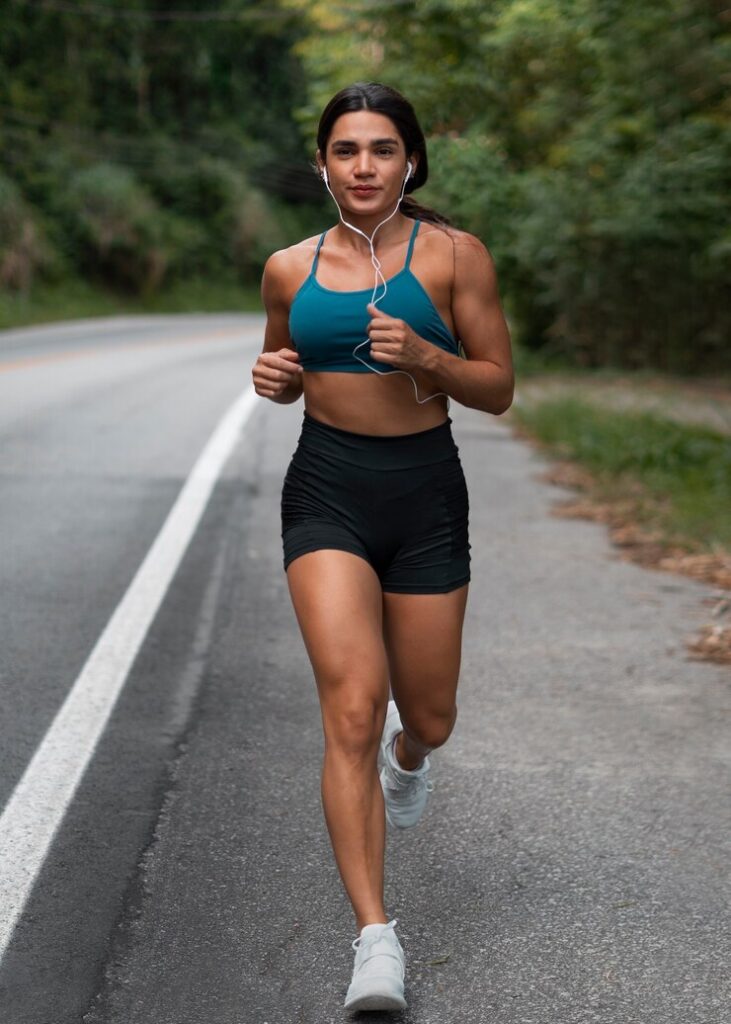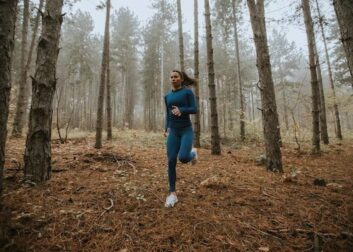Coach Marie Davis Markham
Age Group Runner, High School Champion, College All American, Nike Athlete, Coach
by Charlotte Lettis Richardson
Running and Marie Davis Markham have been together for a long time. For 34 years, from her early days as a youth athlete, Marie has been in love with running and the running world. She started competing at age 8 and remembers laughing through practices, and not running much at all! Her youth coach, Alex Wright, worked with her through high school, along with Lincoln Coach David Bailey, and the remarkable Bob Williams.
In high school, her mileage was very low, 15-20 miles per week, concentrating more on form, speed and recovery. Winning six state championship titles representing Lincoln HS, Marie was also a three-time Foot Locker finalist, and a two-time Junior World Cross Country team member. Attending the University of Oregon, she was coached by the legendary Tom Heinonen, becoming a six-time All American. After Oregon, she went semi-pro for the Nike Farm Team. An injury in 2004 closed her competitive running career, but Marie never stopped running, and never stopped loving her sport. In 2017 Marie came back to Lincoln High School as a volunteer coach, and her impact was immediate. Her love of her sport and her love of her high school helped her bring something special and different to the team. Late summer, as a coach, she went to the Steens Running Camp and learned about “Girls Talks” from a former teammate at Oregon, Melody Fairchild. She describes that Steens experience as “life changing”. She brought “Girls Talks” back to the Lincoln XC Girls Team, and amazing things began to happen. The girls began to talk about important running and life issues. Below is her interview, and the story of her love of running and how a coach can impact the lives of her athletes in sports and beyond.
–Charlotte Lettis Richardson
Coach Marie Davis Markham Interview
Can you talk about your relationship to running and the running community in your life? What was your “tribe” of family and friends in high school like?
Running has always been a love of mine. It started out as something I really loved doing with my friends and family. When I was very young I’d watch my parents finish local races or tie their shoes up and head out on Wildwood trail. My friends and I all joined the local youth track club. Running just seemed like something everyone did. I didn’t start out as a great track athlete. I usually finished last in the 400 or the long jump but I loved it. Probably because our workouts consisted of blob tag, capture the flag and sprint mechanics. As I got older, I got better, and running became a pretty central thing in our family’s life. We traveled each fall and summer to cross country and track meets, it’s something that connected us as a family and with other families.
What made you want to go back to your Alma Mater, Lincoln HS, to coach? What was it like to be back at your old school and coaching young runners?
I had been away from the competitive part of track for 14 years and I missed it. At that point in my life I had been a 2nd grade teacher for 17 years and was working part time to raise my young kids. With a more flexible work schedule, I realized coaching was something I might be able to dabble in. I knew, if I went anywhere, it would have to be Lincoln. Many people don’t have fond memories of high school, but I loved it. My Lincoln days were some very formative years. I really grew as a person. I became confident with who I was. I love being back and seeing myself in so many of these young student athletes.
(From top and clockwise) Marie in a mixed age 1500, giving her dad a high five, and running a Lincoln HS Relay
Can you talk about the coaches you have had in your life and their influence on you and how you coach? Could you describe some of the positive coaches and their coaching style and influences on not only your running, but also on your life?
I hit the jackpot with coaches. I could talk about them forever.. I believe my competitive career was so long because I had many people looking out for my best interests–coaches who wanted to see me improve but not at all costs. They saw their role as a chapter in my running story. I PRed every season of my life except for my last two years on the Farm Team.
My first coach coached me from a youth runner through high school. His name was Alex Wright and he was magnificent. Most of my memories are from laughing our way through practice. He had the corniest jokes and he’d laugh at himself more than we would. He understood how to coach youth runners. We didn’t run much at all. In fact, in high school I only ran 15-20 miles a week. The focus was all on speed and our running form. We ran short and fast all the time with big recovery. He completely instilled the love of running in me and taught me that you don’t have to run a ton to be good!
Another high school coach was Mr. Bailey. He influenced me to see running within a big picture. To realize it wasn’t everything and that being a well-rounded person was going to serve me well in life. My last year in high school I was coached by Bob Williams. It was the first time I was really ready to make running a priority. He also excelled at asking the right questions. I have this feeling he came to practice with a couple workouts up his sleeve, would question me on how I was feeling, and then adapt the plan to my day–a true magician of a coach. Asking the right questions at the right time is a huge goal of mine and still feels really challenging.
Tom Heinonen was my college coach at Oregon. He took my low mileage in high school and saw that as a strength. My transition was flawless–gradually easing me in but focusing on my strengths. Just like high school, we ran fast with lots of rest. It was perfect for me. More than anything, Tom was a constant support in my life. I could go to him with anything and I did!
Lastly, I’ve been influenced by the current head coach at Lincoln, Eric Dettman. Being on the coaching side of things, I never realized how much thought went into every part of the team. Eric is a dynamic person and the relationships he builds among the athletes and coaches is something you can’t coach. He’s challenged me and pushed me to do more, giving me the confidence to build relationships and trust who I am. Those things in turn have made me a better coach.
(From top and clockwise) With her teammates and Coach Heinonen at University of Oregon; with Lincoln XC Team and Coach Dettman (top second from right) in 2019; and at the Foot Locker National XC Championships with Coach Alex Wright (far left)
I am fascinated by the duration of time you have been involved in running? Why do you think you made it this many years and still love it? (So many age group runner’s burnout and don’t make it to the level you have.)
First, I had so many people who truly cared about me as a human before a runner. My parents were adamant that my mileage remained low and that I participated in many sports. I played soccer through 8th grade, skied in the winter and played basketball through my Junior year in high school. I was a full time “tom boy”. I struggled when identified by others as a runner. I pushed that label away as much as I could. Don’t get me wrong, I was proud of my accomplishments but I didn’t want that to be who I was. I just wanted to be Marie.
My coaches were also crucial in my development. My mileage was always low. I ran 15-25 miles a week in high school with a focus on speed and running form. In college I got up to averaging around 35-45 miles, with a peak week around 55 or 60 miles each season. I remember those weeks, I felt like I was running every moment of the day.
Because of my low mileage, I was only injured two times–once in college and once in 2004, which ended my career. I feel that I had momentum every year to build on what I had just done because I never had to sit out. And with that momentum it made me more confident and ambitious.
In hindsight I think I did a really good job of recovering. I took my easy days easy when my body was tired and I took one month off after every season. No running at all. More than anything, that month gave me a mental break from the pressures I felt as a runner.
It also helps that I am extremely competitive. I really don’t like to lose at anything. I would get into races over my head and that competitive fire helped me succeed in situations where I probably shouldn’t have.
5. How does the four years of your HS career differ from the four years of a young female runner’s life in 2020? Please paint us a picture of changing times, if any?
How does the 4 years of your HS career differ from the 4 years of a girl runners life in 2020? Please paint us a picture of changing times, if any?
Overall I think they are very similar. Teenage girls are going through a lot of changes physically and socially no matter when they are in school. There are a lot of pressures to look or act a certain way. The challenges of adolescence is comparable. What is different is the access to science and knowledge. We know so much more than we did in the 1990’s. In that regard we also know so much more about what our competitors are doing. That can be hard. Often I see athletes focusing more on their competitors’ performances than their own. They can find out how other athletes are doing in real time. Often that takes energy away from their own journey.
How has being an age group runner, an elite runner, and now a recreational runner informed your coaching style?
Being a lifelong runner has helped me appreciate what this sport can give you during all times of your life. I believe I have a perspective that many don’t have. As a coach I think my experience across different levels of running makes me more relatable. The kids know I’ve been there. They know I understand where they are and I feel they come to me asking for advice. As a coach my strengths aren’t writing the workouts but rather helping them develop confidence and putting things in perspective.
What keeps you putting on your training shoes and going out the door to run?
Running has become my therapy. I now run to clear my mind. It gives me time to think and reflect about life. To slow down, step away from technology and the demands of being a mom, wife, teacher, coach and friend. It really gives me time to take care of myself emotionally. I’m happier when I’m getting a couple runs in a week.
Coach Marie Davis Markham running at Lincoln HS (left) and the University of Oregon
How did the idea of “Girls Talks” evolve? Did you see a special need in the community of HS female runners?
A life changing moment happened in my coaching career. Two years ago, I was at Steens Mountain Running Camp and my old teammate at Oregon, Melody Fairchild, was holding a girls only session focusing on distance runners and the stigma that they often slow down or regress for a bit while they hit puberty. She was challenging the idea that if we are healthy females and listen to our bodies, not only can we come out of it as stronger runners, but we can improve when our bodies are ready. My girls were thrown for a loop. They wanted to talk and talk and talk about this topic. They were able to connect to what Melody said and they wanted more. Most importantly these girls wanted to bring it back to the team. From that moment on we started a series of female talks that focus on all sorts of topics. Hard ones, complicated ones, easy ones, basically anything.
Please describe “GT” and how it is set up and works? Can you describe a session for us?
The purpose of a Girls Talk is to give the girls a place to talk about issues they may be dealing with at this point in their life. We come together multiple times a year and they suggest topics they would be interested in talking about. Coach Dettman and I also determine topics based on what we think is important at that time. I then create a safe space where we dive into the topic.
We always start with snacks to loosen them up, chat and giggle a bit. Then I follow a pretty strict lesson plan. Being a teacher for 19 years, I think it’s imperative to have a plan. It’s crucial to making sure we meet the objective and also give them time to talk. My goal is that I talk 10% of the time and they talk 90% of the time. It looks something like this:
- Introduce the Topic/Big Idea and why it’s important or relevant.
- Give examples of times when I was and wasn’t successful in regards to this topic. It is important for them to see I have failed as well.
- Have them reflect on paper to an open ended question. I want them to get thinking about themselves. This is also important for the girls who don’t feel as comfortable talking within a group.
- Provide an article to read that focuses on the topic.
- Now the girls talk. I usually provide an essential question or two that leads them toward my targeted outcome, but I let them talk. I do probe along the way when I feel it’ll push the conversation. This time usually lasts for 30-45 minutes.
- The girls take time to reflect again about their practice as a runner or a female. Usually they are reflecting on something they want to improve on and apply to their life.
I see “Girls Talks” as a support group? Do you see it that way? What other ways does “GT” influence girls?
Absolutely! Girls need to talk. Research shows females speak up to 20,000 words a day and males speak 7,000. Our Girls Talk gives them a group to talk about their feelings. As we all know, people behave differently in similar situations. My goal is to give girls the confidence to make great choices guided by believing in themselves, treating their bodies respectfully and respecting others. By having these discussions it gives girls the tools to make great choices when things get tough for them or a teammate. Often times teenagers don’t want to talk with their parents about these topics so having a group like this gives them a place to discuss these issues with an adult who has been in their situation.
What are your goals and hopes for “GT” and where do you imagine it going?
My goal would be all high school and collegiate athletic programs provide female student athletes a space to talk about the challenges females go through physically, academically, socially and within their specific sport–to provide space for discussion to build confidence in girls as they are transitioning through puberty as well as navigating social norms and expectations. It may take some time before we see Girls Talk in all programs so in the meantime I hope to impact my local community and the coaches I know to take this on as part of their practice.
How can a male coach better prepare himself to coach girls and young women?
It’s all about building relationships that are real and authentic. I have seen it done perfectly, with our head coach, Eric Dettman. He isn’t afraid to talk to girls in a real and honest way. He can banter with the best of them, pump up the ones who need it and can be honest when it matters. Girls like to talk, so a male coach who can engage in those conversations, as silly as they may seem, is going to be the most successful.
It is also important for a male coach to truly understand what a female is going through in high school and college. How her body is changing and how that may or may not affect her mood, performance and confidence. It is imperative that a male coach knows the physiology of a female runner at this age.
Could a male coach lead one of the “GT” groups? Explain how? Or not?
Yes! With three things in place, I believe a male could absolutely lead a Girls Talk. First, the girls have to have a relationship where the girls trust him. Second, he needs a strong understanding of the topic they are going to discuss supported by research or literature. Finally, he needs to be able to sit and listen and just let them talk.
Lincoln High School girls participate in Girls Talks
“Girls need to talk. Research shows females speak up to 20,000 words a day and males speak 7,000. Our Girls Talk gives them a group to talk about their feelings. As we all know, people behave differently in similar situations. My goal is to give girls the confidence to make great choices guided by believing in themselves, treating their bodies respectfully and respecting others. By having these discussions it gives girls the tools to make great choices when things get tough for them or a teammate.” – Marie Davis Markham
What do you believe running and competing does for girls? Why would you encourage girls to run or play sports?
Being an athlete is one of the most thrilling and self-fulfilling adventures an individual can embark on. It teaches us so much about ourselves and we learn from every success and failure. Finding that balance between your passion and taking care of yourself as a female is an important lesson. I believe being an athlete puts you in uncomfortable situations and being in those situations is where you are going to grow the most. Athletes also tend to take care of their bodies and have something important to focus on, often that keeps them out of trouble. As a runner, it’s all about you and the effort you put in. What a great lesson to learn!
What coaching differences, if any, do you bring to coaching girls versus boys?
Truly I try and build a relationship with any athlete regardless of whether they are a boy or girl as they all have their unique differences. Getting to know each kid is how you will really connect with them. But generally you will find some commonalities between girls and boys. I think many females like to come together to talk through things and I’m able to provide that for them. I don’t feel the boys need it as much. I have had great conversations with boys but mostly they are one on one. They are just as easy to talk to but they don’t seem to need as much time to work through things as girls do.
Any coaching books or related books you could recommend to us?
I just read “Roar” by Dr. Stacy Sims and it blew me away! So much important knowledge I wish I had known as a competitive runner. I also love the Believe Training Journals. Some of our girls connected with Kara Goucher’s book, “Strong”, about building confidence. Mostly I’m on the search for articles that I can share with the girls.




